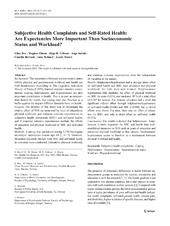Subjective health complaints and self-rated health: are expectancies more important than socioeconomic status and workload?
Ree, Eline; Odeen, Magnus; Eriksen, Hege Randi; Indahl, Aage; Ihlebæk, Camilla; Hetland, Jørn; Harris, Anette
Peer reviewed, Journal article
Published version

Åpne
Permanent lenke
https://hdl.handle.net/1956/9676Utgivelsesdato
2014-06Metadata
Vis full innførselSamlinger
Originalversjon
https://doi.org/10.1007/s12529-013-9329-7Sammendrag
Background The associations between socioeconomic status (SES), physical and psychosocial workload and health are well documented. According to The Cognitive Activation Theory of Stress (CATS), learned response outcome expectancies (coping, helplessness, and hopelessness) are also important contributors to health. This is in part as independent factors for health, but coping may also function as a buffer against the impact different demands have on health. Purpose The purpose of this study was to investigate the relative effect of SES (as measured by level of education), physical workload, and response outcome expectancies on subjective health complaints (SHC) and self-rated health, and if response outcome expectancies mediate the effects of education and physical workload on SHC and self-rated health. Methods A survey was carried out among 1,746 Norwegian municipal employees (mean age 44.2, 81 % females). Structural Equation Models with SHC and self-rated health as outcomes were conducted. Education, physical workload, and response outcome expectancies, were the independent 28 variables in the model. Results Helplessness/hopelessness had a stronger direct effect on self-rated health and SHC than education and physical workload, for both men and women. Helplessness/hopelessness fully mediated the effect of physical workload on SHC for men (0.121), and mediated 30 % of a total effect of 0.247 for women. For women, education had a small but significant indirect effect through helplessness/hopelessness on self-rated health (0.040) and SHC (−0.040), but no direct effects were found. For men, there was no effect of education on SHC, and only a direct effect on self-rated health (0.134). Conclusions The results indicated that helplessness/hopelessness is more important for SHC and health than well-established measures on SES such as years of education and perceived physical workload in this sample. Helplessness/hopelessness seems to function as a mechanism between physical workload and health.
